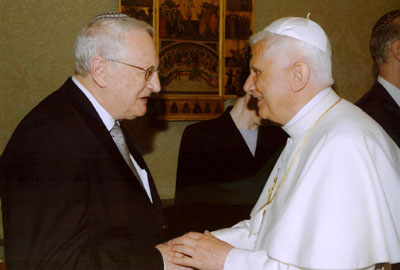
(RNS1-FEB26) Catholic and Jewish leaders met in Washington Thursday (Feb. 26) to mend fences, make plans for ongoing dialogue and to honor Rabbi Leon Klenicki, the longtime interfaith director for the Anti-Defamation League, shown here greeting Pope Benedict XVI in an undated photo. Klenicki died Jan. 25 at age 78. For use with RNS-CATHOLIC-JEWISH, transmitted Feb 26, 2009. Religion News Service photo courtesy ADL.
WASHINGTON — In the wake of controversies that have roiled longtime Jewish-Catholic relations, leaders from both faiths announced the launch of a new permanent dialogue between Catholics and Jews in the United States.
The joint project of the Pope John Paul II Cultural Center and the Anti-Defamation League, announced here Thursday (Feb. 26) comes at a time of significant tension between the Vatican and the international Jewish community.
Jewish organizations are outraged that Pope Benedict XVI readmitted into the church in January leaders of the Society of St. Pius X, including Bishop Richard Williamson, who has denied that millions of Jews were killed in the Holocaust.
Twenty-eight leaders joined for Thursday’s launch at the John Paul Center, with plans to determine by May who will be included in the forthcoming dialogue. Hugh Dempsey, deputy director of the center, said it will include a wide range of Jewish organizations, scholars, and rabbinical associations as well as the Vatican and the U.S. Conference of Catholic Bishops.
Abraham Foxman, national director of the Anti-Defamation League, said the dialogue began as leaders marked 30-days since the death of interfaith relations pioneer Rabbi Leon Klenicki. Klenicki retired in 2001 as the ADL’s liaison to the Vatican.
But Thursday’s meeting was also intended to respond to what he called the recent “mini-crises,” Foxman said.
“We were concerned that they not build into a major crisis,” he said.
Cardinal Sean Patrick O’Malley of Boston said most Catholics were alarmed by the recent crisis surrounding Williamson.
“Obviously, the whole church is very, very pained by the outrageous statements that he made and have been quick to disassociate ourselves from them,” said O’Malley. “The Holocaust is certainly the greatest crime in the history of humanity and for anyone to try to diminish that or downplay it is absolutely outrageous.”
Foxman said many Jewish leaders, some of whom have met with the pope since the Williamson controversy and heard the pope condemn Holocaust denial, are now satisfied. But he is not one of them.
“Some of us feel that it’s inconsistent; and every day that a bishop remains within the church who espouses anti-Semitism and Holocaust denial is a sad day for the church and for the dialogue,” he said.
The Rev. Dennis McManus, assistant director of the John Paul II Center’s Intercultural Forum, said he thinks Vatican leaders have gained an understanding of the need for better communication.
“My impression is that there’s been a lot of learning in the last few weeks in the halls of the Vatican,” he said.
Benedict has insisted that Williamson recant his views on the Holocaust before being allowed to assume episcopal duties in the Catholic Church.
Dempsey, the deputy director of the Pope John Paul II Center, said the “permanent” dialogue aims to be broader than other Catholic-Jewish efforts.
“Because it will be permanent, they will be able to as a body be proactive and reactive to things that happen on the world stage,” he said in an interview Wednesday. “This …is much more a broad-based, finger-on-the-pulse kind of thing.”
Rabbi Irving Greenberg, founding president of CLAL – The National Jewish Center for Learning and Leadership, said “the group felt in general that we should not get lost in the current crisis. There’s a big agenda there that still has to be done.”
Eugene Fisher, the former head of the U.S. Catholic bishops’ Catholic-Jewish relations team, said talks between the Catholic bishops and groups such as the ADL have occurred for decades.
But he said it’s a “commendable goal” to bring Catholics and Jews together in this new way.




